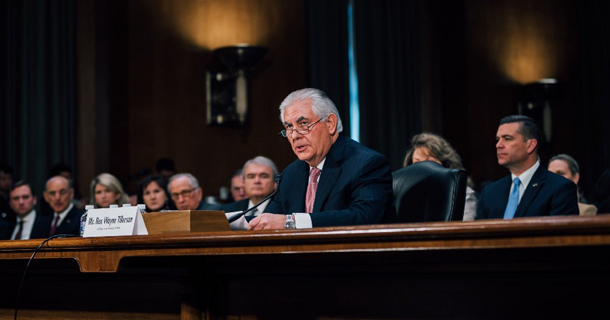Newly confirmed Secretary of State for the United States of America Rex Tillerson confirmed his commitment to continued support for Tibet during his confirmation hearing.
In response to written questions on Tibet from members of the Senate Foreign Relations Committee, Mr Tillerson confirmed his commitment to promoting human rights issues during US diplomatic engagements with China, including the cases of political prisoners.
High priority issues for the new Secretary of State include the religious freedom of Christians, Tibetan Buddhists, Uygyur Muslims and Falun Gong practitioners. Mr Tillerson emphasised that China was labelled a country of particular concern in the annually released International Religious Freedom report, and suggested that evaluations on the state of religious freedom should continue to be monitored in this way.
Mr Tillerson said that while he recognised Tibet as part of the People’s Republic of China, he would continue to encourage dialogue between Beijing and the Tibetan Government-in-Exile or representatives of His Holiness the Dalai Lama. This announcement has prompted an angry response from China. The Chinese state-run Global Times quoted Zhu Weiqun, head of the ethnic and religious affairs committee, as saying that dialogue between the two will never happen as China recognises the “Tibetan exile set-up” as illegal.
In wider terms, Mr Tillerson encouraged the governments of all nations, including Beijing, to respect and preserve the distinct religious, linguistic, and cultural identity of Tibet.
In response to questions Mr Tillerson emphasised his commitment to receiving and meeting His Holiness the Dalai Lama. He described the denial of visas and the restriction placed on reporters, civil society activists and diplomats in Tibet as “problematic”.
On the question of limiting the number of visas allowed to executives from the Chinese state media, or Chinese officials, Mr Tillerson answered by committing to assessing what the best policy would be, while recognising that reciprocity in treatment is a principal in bilateral relations.
Mr Tillerson used to be the Chairman and Chief Executive Officer of Exxon Mobil before he was nominated by President Trump as his choice for Secretary of State in the new Administration. Mr Tillerson was approved by the Senate Foreign Relations Committee with 11/10 votes, and confirmed as Secretary of State on February 1 by the full senate with 56 votes in favor, 43 against and one abstention.
United States President Trump said, during a phone call with China’s President Xi Jinping, that he would agree to honour the “one China” policy. This is an about turn from a statement he made in December while speaking to the President of Taiwan that the US did not have to stick to the policy which acknowledges that Taiwan as part of China. A White House statement said his change of mind was “At the request of President Xi”. Beijing issued a statement saying that China “appreciated Trump’s upholding of the ‘one China’ policy’” and that “the ‘one China’ principle was the political basis of Sino-US ties…Ensuring this political basis does not waver is vital for the healthy, stable development of China-US relations”.





 Print
Print Email
Email